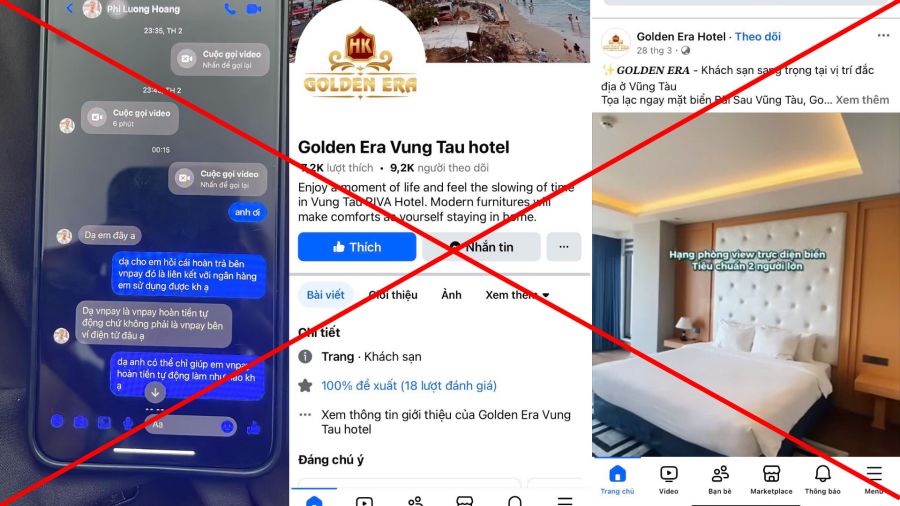From a deposit trap to forging a chief accountant
Having long wanted to have a weekend vacation with her family in Tam Dao (Phu Tho), Ms. Nguyen Thi Linh Huong (character's name has been changed) has been looking for hotels and motels in the above area at preferential prices.
Surfing social networks, she saw a fanpage promoting the hotel with sparkling images, the preferential price was only half of the listed price. The Fanpage also leads to a booking website with a neat, professional interface that is no different from an official page: Hotel logo, hotline, even a "customer's evaluation" section with a series of comments praising.
Trusting her, Ms. Huong chose a 3-day, 2-night vacation package, quickly filled in her personal information and transferred a deposit of more than 2 million VND. Immediately after completion, the system sent a "room booking confirmation certificate" with a fake QR code and stamp, making her feel more secure.
However, when the whole family arrived in Tam Dao, the hotel host confirmed that they had not received any bookings. The "counselor" phone number she used to contact has now been blocked, and the website has also disappeared.
Immediately after that, she had to look for a nearby hotel to stay in because the hotel had no more rooms. In addition to Ms. Huong, many customers have fallen into the trap of these subjects when they have a need to travel to other localities.
If Ms. Huong's story is proof of the trick of building fake fanpages and websites to appropriate deposits, the case of Mr. Trinh Van Tuan (character's name has been changed) shows an even more sophisticated trick of pretending to refund money to defraud many more times.
Mr. Tuan booked a room at a hotel named Golden Era Vung Tau through a very professional website and fanpage, transferring 1.5 million VND in deposit. When he realized that he had been scammed, he contacted him again, but a person claiming to be the "head accountant" appeared, promising to repay the full amount. This person sent a link and QR code, asking him to enter bank information "to verify the account", then continuously urged him to pay additional "refund unlock fee", "transaction insurance fee", "international bank fee".
For a few hours, Mr. Tuan was caught up in a fees loop, and when he stopped, the amount he lost was 5 times the initial deposit. All contact accounts then disappeared.
The common point in both cases is the well-planned fraud scenario: Building a fanpage, creating a fake website, impersonating hotel staff, even adding a "chief accountant" to increase reliability.

Absolutely do not transfer 100% to personal accounts
Expert Vu Ngoc Son (National Cyber Security Association) warned that many blue-tick fanpages with the name A were bought back, then renamed B, which is almost the same as the real brand. Users can easily confuse when searching, making it extremely difficult to distinguish between real and fake.
In addition, new technologies such as artificial intelligence (AI) allow the creation of fake websites in just a few minutes, with an interface almost like the original star. If users are not vigilant, especially if they do not check the URLs on the browser carefully, the risk of falling into the trap is very high.
Faced with this situation, many cybersecurity software, including free tools from the National Cyber Security Association, have integrated a feature to warn of fake links. Some banking applications today are also capable of automatically locking transactions if they detect devices containing suspicious software.
To avoid becoming victims, experts say that tourists need to equip themselves with basic skills and knowledge. Carefully research information about travel companies, choose a reputable unit with positive reviews on platforms such as TripAdvisor, Google Reviews or through introductions from acquaintances.
Absolutely do not transfer 100% to personal accounts before receiving clear service confirmation, so requires transparent contracts and documents. At the same time, it is necessary to carefully check information about hotels and services on reputable booking sites, compare real-life photos and user feedback before making a decision.
The Department of Cyber Security and High-Tech Crime Prevention, Ministry of Public Security also issued a warning: People who need to search for tours, book hotel rooms... through social networks should carefully check the transparency of the page, history of changing the name, and country of the administrative member. If you see a new account or a new name change, be vigilant and carefully check information from many different sources.









